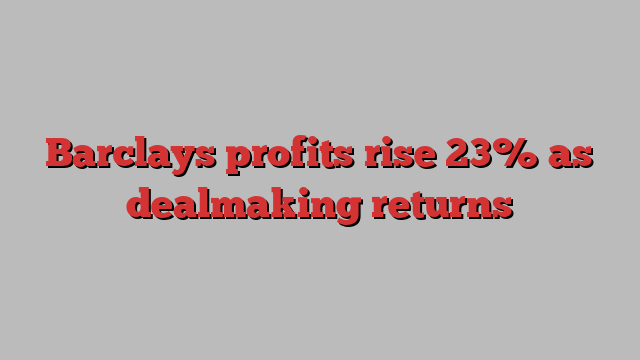
Unlock the Editor’s Digest for free
Roula Khalaf, Editor of the FT, selects her favourite stories in this weekly newsletter.
Barclays’ profits rose 23 per cent to a better than expected £1.6bn in the third quarter, as the bank was boosted by high interest rates and a pick-up in dealmaking.
Analysts had expected the UK bank to report attributable profit of £1.3bn.
Barclays on Thursday reported net interest income of £1.7bn — slightly above forecasts of £1.6bn — and lifted its guidance for the year from around £11bn to more than £11bn. It also raised the guidance for net interest income from its UK domestic bank to £6.5bn from £6.3bn.
Barclays’ investment bank, which has been a focus for shareholders, reported income of £2.9bn, a 6 per cent rise on a year earlier, as equities trading and renewed dealmaking activity boosted fees and underwriting income this year.
The results echoed Barclays’ rivals on Wall Street, where the return of mergers and acquisitions after a two-year hiatus and volatility in global stock markets in August have lifted investment banking.
Barclays’ chief executive CS Venkatakrishnan said he expected the rebound in M&A to continue, as inflation calmed and the US and UK economies avoided recession.
However, Venkatakrishnan said the outcome of the US election could change the macroeconomic picture and affect dealmaking.
“We have to see who comes in. We have to see what economic officials and trade officials they put in and what their policies are, and that can obviously add some volatility,” he said.
Barclays’ investment banking co-heads Taylor Wright and Cathal Deasy this month laid out how they planned to boost returns for the business by increasing its focus on advisory work and equity capital markets.
Investment banking fees and revenue from underwriting were up 58 per cent year on year. But the increase was mainly driven by a rise in debt capital markets fees, boosted by leveraged finance work.
Barclays’ revenues from equities trading and its traditional strength of fixed income rose 3 per cent from the same quarter last year, to £675mn and £1.15bn, respectively.
The investment bank’s trading division could benefit from the knock-on effects of the US election on markets, Venkatakrishnan added. “In periods of high volatility If we can serve our clients in a risk-managed way, it’s good for our clients and it’s good for the bank”.
Barclays also said it incurred a £85mn fair value loss on leveraged finance lending in the third quarter at its international corporate bank, where revenues fell 12 per cent.
In its UK retail bank, Barclays set aside £82mn for bad loans, down from £267mn in the same period last year, due to “low delinquencies in UK cards, high-quality mortgage lending portfolio and the improved macroeconomic outlook”.
The lender said its acquisition of the bulk of Tesco’s bank would become effective in November and help bolster its capital alongside the sales of its German and Italian retail loan books this year.